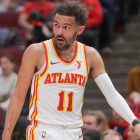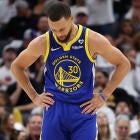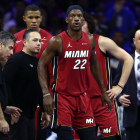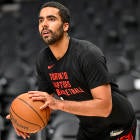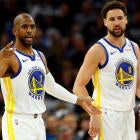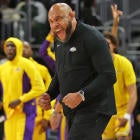
It all comes back to Eric Bledsoe. Every decision the Milwaukee Bucks have made in the past two years can be traced to the moment Jon Horst opened Pandora's box and stuck a four-year, $72 million extension for his starting point guard inside. Without the Bledsoe deal, the Bucks have the cash to re-sign Malcolm Brogdon underneath the luxury tax. If Brogdon stays, Milwaukee doesn't need to dump all of its draft capital into Jrue Holiday. If Holiday is never acquired, he's never handed a four-year max extension worth nearly double what Brogdon got from the Pacers.
No single reactionary move was indefensible in itself. Brogdon's injury issues made him a risky proposition. Holiday has been everything Milwaukee could have hoped for. If the Bucks hadn't paid him, half a dozen other teams would have competed for the chance to do so this summer. There are worse places to be than 32-17 with a two-time reigning MVP. You make the sort of expenditures Milwaukee has made specifically to get to this point.
It just goes to show just how much a single mistake can compound. It's the tragic lifecycle of most budding contenders. For every dynasty, there are 10 James Harden trades, self-inflicted wounds based on poor judgment or internal squabbles or financial fictions that topple juggernauts before they can grow into champions. The Bucks recognized their mistake early and have done everything in their power to correct it. It may or may not be enough to salvage their championship ambitions, but it created an unparalleled strain on the future that once awaited them.
In the next seven NBA drafts, Milwaukee controls only one of its own first-round picks. At a bare minimum, the Bucks will be paying the luxury tax for at least the next two seasons, three if Khris Middleton picks up his 2023-24 option. That puts them right in range of the repeater tax should Middleton stay put afterward. The danger doesn't lie in the actual cost, though, but rather, the opportunity cost of Milwaukee's salary structure.
Middleton will turn 30 this offseason. Holiday turns 31 in June, and his own medical history is far from ideal. Brook Lopez is 33 and P.J. Tucker is 35. Donte DiVincenzo is the only core Buck outside of Giannis Antetokounmpo on the right side of the NBA's traditional aging curve, and by the time he hits his peak, his teammates will be past theirs. The Bucks are contenders, but not favorites. They very well could win a championship in the next several years, but it's worth considering what might happen if they don't.
The Bucks have no exit strategy. They have no obvious method of internal improvement and a salary structure that inadvertently prevents any sort of instant reboot. As tempting as it might be to try to lure a star free agent to play alongside Giannis, all five Milwaukee starters have contracts that expire in different seasons. That practically rules out the possibility of max cap space in any single offseason. There won't be another Holiday-style trade in the works because the original Holiday deal deprived them of their assets. If DiVincenzo extends this offseason, he'll be hard to trade next year because of base-year compensation. If he doesn't? He'll be hard to trade for anything meaningful because he barely makes any money. At best, their next likely shot at a major move will come at the 2023 trade deadline, when Lopez will have a $14 million expiring contract and their 2029 first-round pick will be tradable. What's one more line of credit for a team that's already taken out four mortgages on its future?
The Bucks know what the alternative looks like. They lost a 27-year-old Kareem Abdul-Jabbar and had to wait 40 years to replace him. Players like Antetokounmpo can't be squandered. The Bucks had no future without Giannis, so they sold the one they had for a present worthy of such a player. Antetokounmpo was under contract for one year before the Holiday trade. He's under contract for six now. That's worth an extra $136 million and then some. The Bucks were over next season's projected cap even before Holiday's new deal. They never could've created the space to replace him had he walked.
But lay out every possible outcome here and a startling number look bad for the Bucks. In some, Holiday gets hurt. In some, he and Middleton and Lopez age badly. In some, none of this matters because of the bullies in Brooklyn, and the Bucks spend the next several seasons as a casualty of the Nets' rampage through the Eastern Conference.
These aren't reasons not to re-sign Holiday. They are ways that the decision to do so, no matter how necessary, can still go horribly wrong. The road to chaos is paved with good intentions, after all, and even if the Bucks used the Holiday trade as an off-ramp, the journey started at the Bledsoe extension. That one mistake cost the Bucks their depth, the draft capital and their flexibility. They no longer have those safety nets. If this deal turns out to be the same sort of mistake, the cost is going to be far greater.
The gamble positions the Bucks as one of the NBA's all-time all-in propositions. Banners fly forever. A championship buys you another four decades of patience with your fan base. That patience will start to wear thin with each successive season ending in anything other than confetti. Antetokounmpo is happy in Milwaukee for the moment. Would he be after a second-round exit in 2023 or 2024 playing alongside an aging support cast? Could Milwaukee placate him without the ammo to make another Holiday-sized move at that point?
We don't know. Neither do the Bucks. They're paying $136 million in the hopes that they never have to find out. That chance alone is worth every penny, but it leaves the Bucks with an empty piggy bank. The grace period is over. Milwaukee survived one bad guard contract. Their entire future depends on this not becoming another one.
















